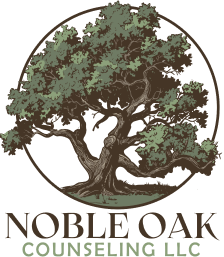At Noble Oak Counseling, one of the most important things I help clients understand is the lasting impact that trauma can have on daily life.
Many individuals who have experienced trauma try to put it behind them—wishing it away, locking it out of their mind, or minimizing its importance. It’s common to hear someone say, “It’s in the past—why would I want to relive it?”
But the truth is, trauma doesn’t simply stay in the past. Without recognizing and addressing its effects, trauma quietly permeates our emotions, behaviors, and relationships.
To help explain this, I often guide clients through a visualization I call the Trauma House.
Visualizing Your Life as a House
Imagine your life as a house. Like any house, it has walls and boundaries.
These walls represent the structure of your life—you can rearrange things inside, but you can’t simply walk away from your life any more than you could step outside the physical walls of your home.
Inside this house are all the important parts of who you are:
- A living room for entertainment and joy
- A study representing your education and personal growth
- Bedrooms for family relationships and intimate partnerships
- Spaces for ambition, hobbies, and dreams
- And perhaps even second and third floors, representing your children and the lives you help nurture
Each room reflects the work you’ve put into building a life you want to live. It’s a place you’ve shaped with intention, effort, and care.
When Trauma Enters the House
Now, imagine someone gives you a chicken—a smelly, noisy, messy chicken.
It’s unpleasant, disruptive, and doesn’t fit anywhere inside your carefully designed home.
Just like no one wants a live chicken loose inside their house, no one wants trauma in their life. Trauma feels violating, vulnerable, and unclean. But you can’t simply discard it or pretend it doesn’t exist.
In this visualization, most people respond by hiding the chicken.
Maybe they shove it into an unused closet, trying to lock it away and forget it’s there.
Out of sight, out of mind.
But the problem is, the chicken doesn’t stay neatly hidden.
Without care, the chicken eventually dies—and the smell begins to spread.
It seeps into every room: the places for joy, ambition, family, and love.
Suddenly, without even realizing it, every part of your life is touched by the presence you tried so hard to ignore.
Similarly, when trauma is left unaddressed, its impact slowly permeates:
- Guilt, shame, or anger cloud your thoughts
- Hypervigilance, avoidance, or emotional numbness creep into your behaviors
- Fear and self-doubt whisper in moments meant for joy and connection
Trauma touches every room, every interaction, every relationship—even if you aren’t consciously aware of it.
Why Processing Trauma Matters
To truly heal, you can’t simply ignore the smell and hope it fades.
You have to find the courage to open the closet, face what’s inside, and deal with it directly.
Processing trauma doesn’t mean re-experiencing it over and over.
It means gently unpacking the guilt, shame, fear, and protective behaviors that trauma left behind.
It means challenging the belief that you were to blame.
It means offering yourself compassion rather than judgment.
Only through this work can the trauma lose its power.
Only through this work can the “smell” begin to fade, allowing you to reclaim your house—and your life.
The Impact on Future Generations
It’s also important to remember that trauma doesn’t just affect you.
If you’ve built second, third, or even fourth floors for your children, the smell reaches them too.
Children may experience the effects of unprocessed trauma through:
- Emotional distance or overreactions
- Yelling, avoidance, or fear-driven behaviors
- Patterns of instability that echo across generations
By facing the closet and dealing with what’s inside, you not only free yourself—you offer a healthier, stronger foundation for those you love.
Final Thoughts: Taking the Courageous Step Toward Healing
Acknowledging trauma is not easy.
It takes real courage to open that closet, face the uncomfortable truths, and begin the hard work of healing.
But your house—your life—is worth it.
Your children, your future relationships, and your own peace of mind are worth it.
At Noble Oak Counseling, I offer a compassionate, supportive space to help you process trauma safely, build resilience, and create a life that feels whole and fulfilling again.
If you are ready to reclaim your house and heal from the past, I invite you to reach out today.
You don’t have to do it alone. Healing is possible—and it begins with taking the first step.







